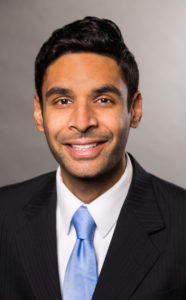
Meet Dr. Patel
Dr. Anik Patel M.D. FAAP is a pediatrician working at Children’s Mercy Hospital Kansas City where he specializes in Pediatric Global Health and Pediatric Emergency Medicine. He joined MOAAP eight years ago in 2014 and loves being able to visit the capitol building to advocate for change. Dr. Patel was recently appointed to the AAP Council on Immigrant Child and Family Health (COICFH) where he will have the opportunity to advocate for the health and rights of immigrant and refugee children.
Learn more about Dr. Anik Patel in his own words:
What is your vision for your work on the AAP Council on Immigrant Child and Family Health?
I’m so honored to be appointed to a position on the Executive Council for COICFH. I have looked up to many of the folks on this council for the past few years. I have admired their work, advocating for the health and rights of immigrant and refugee children who are amongst the most vulnerable in American society as well as building a community of providers dedicated to this population. I would like to continue this work, advocating for the rights of these children to be healthy and happy within our borders as well as abroad.
What has been your biggest (or one of your biggest) professional accomplishments?
I can’t point to exactly one accomplishment, but I feel as if my career has been built upon small successes and learning opportunities, one building upon another. I grew up in Jeff City, and I never could have imagined how far I’ve come since then. I’m grateful for the folks who have guided my career path, particularly Jennifer Watts (at Children’s Mercy Hospital in Kansas City) and Jeff Robison (at Primary Children’s Hospital in Salt Lake City), but also so many others who have given me advice, mentorship, and community. Whatever I accomplish in my career is only a reflection of the dedication and investment of these folks in my personal growth and career development.
What’s a fun fact about you that not many people know?
I don’t know if there’s a lot that is interesting about me, but I’m a mediocre skier. I learned how to ski in 2019 during my global health fellowship based out of Salt Lake City, and for a guy who had never really even seen mountains before then, I’ve come a long way. I can finally go down blue runs (and hop on a ski lift without falling on my face).
What is a lesson that you have learned in your career?
One of the biggest lessons I have learned so far in my career (which sounds a little strange to say given I have only been out of residency for now 5 years), is that your career isn’t linear. There are ups and downs, new opportunities that open up, new places that you may work, new interests that may take you down paths you weren’t expecting. I never thought starting my residency in Kansas City in 2014 that I would end up doing two fellowships (in pediatric global health and now pediatric emergency medicine) or live and work in Rwanda and the Navajo Nation or have the opportunities I have now in global health, working in refugee camps around the world and participating in global health education and advocacy. It’s been amazing to see my career evolve and change.
What is the moment that made you feel like you made the right choice in becoming a pediatric health provider?
I can’t pinpoint an exact moment, but I do know that my work in refugee camps around the world has been the most fulfilling work I have ever done. I have had the opportunity to work in camps in Greece with migrants and asylum seekers from the Middle East and Africa; Bangladesh with Rohingyan refugees; and along the US/Mexico Border with asylum seekers and migrants from Latin America. It is the honor of my life to be able to work with displaced people around the world, to bear witness to their stories, and to take care of their children. Despite unimaginable trauma and incredible obstacles, I have seen how resilient children can be. Working with displaced people is my life’s work, and I’m incredibly proud that I am a pediatrician.
What does advocacy mean to you?
Advocacy to me is an essential part of our jobs as pediatricians. It means using our platforms to amplify the voices of those who are most vulnerable and marginalized in society. We advocate for our patients and their families everyday at work, and we should advocate for them outside of the hospital or clinic as well. Social determinants of health dictate how well a child will do in life, and I strongly believe we, as physicians, should advocate for policies that improve our patients’ outcomes.
